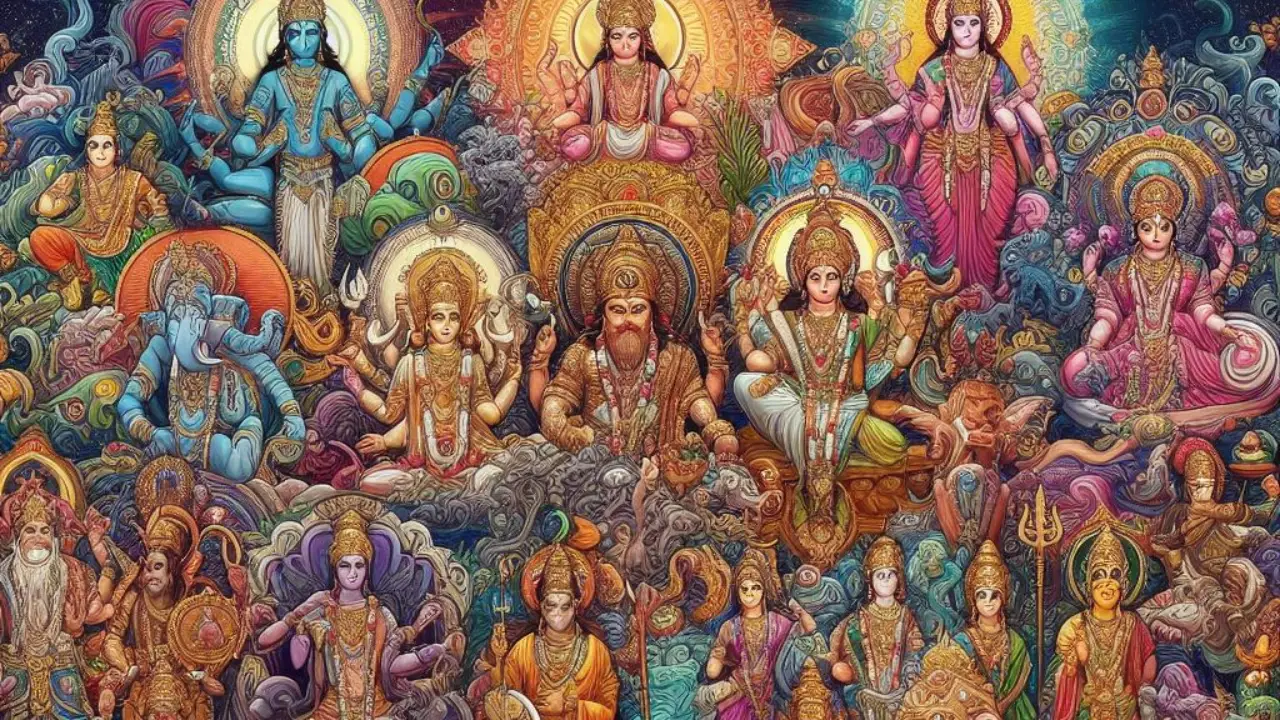Hinduism is one of the oldest religions in the world, with a rich and diverse set of beliefs and practices. One of the most striking aspects of Hinduism is its pantheon of gods and goddesses, which reflect the many faces of god as perceived by Hindu devotees. In this article, we will explore some of the most prominent deities in Hinduism and their significance in the religion.
First, it is important to note that Hinduism does not have a single, unified concept of God. Instead, there are many gods and goddesses, each with their own unique qualities and attributes. Often, people associate these deities with various aspects of the natural world, such as the sun, moon, and earth, or with specific virtues, such as wisdom, compassion, or bravery.
In this enlightening journey, we shall delve into the multifaceted aspects of God in Hinduism, understanding how each divine manifestation represents various facets of the universe and human experience.
Brahma: The Creator as the Many Faces of God in Hinduism
Hinduism views Brahma as the creator of the universe, the originator of life, and the architect of all existence. Portrayed with four faces and four arms, he symbolizes the four Vedas and embodies the ever-evolving nature of creation.
Vishnu: The Preserver as the Many Faces of God in Hinduism
Vishnu, with his ten avatars like Rama and Krishna, preserves the cosmic order and intervenes whenever darkness threatens to overpower the light. He represents harmony, righteousness, and eternal benevolence.
Shiva: The Destroyer and Transformer as the Many Faces of God in Hinduism
Shiva, often depicted in meditation or as Nataraja, the cosmic dancer, signifies the cyclical nature of creation and destruction. He brings about transformation, demolishing the old to make way for the new.
Devi: The Divine Mother as the Many Faces of God in Hinduism
Goddess Devi manifests in various forms such as Durga, Lakshmi, and Saraswati. She epitomizes the feminine aspect of divinity, representing nurturing, power, and creativity.
Ganesh: The Remover of Obstacles as the Many Faces of God in Hinduism
With the head of an elephant and a playful demeanor, Lord Ganesh is invoked as the remover of obstacles and the patron of intellect and wisdom.
Hanuman: The Ultimate Devotee
Hanuman, the monkey-god, exemplifies unwavering devotion and loyalty. He played a crucial role in the epic Ramayana and symbolizes courage and selflessness.
Krishna: The Enchanter
Lord Krishna enchants the world with his divine flute and mesmerizing personality. He embodies love, joy, and spiritual wisdom, imparting valuable life lessons through the Bhagavad Gita.
Surya: The Sun God
Surya, the radiant sun god, represents the life-giving force and symbolizes knowledge, enlightenment, and cosmic illumination.
Indra: The King of Gods as the Many Faces of God in Hinduism
Indra, the mighty god of thunder and rain, governs the celestial realms and is associated with courage and valor.
Agni: The Fire God
Agni, the god of fire, serves as a link between humans and gods, conveying offerings to the divine and carrying prayers to the heavens.
Varuna: The God of Cosmic Order
Varuna upholds the cosmic order and associates with the oceans and waters, symbolizing cosmic law and justice.
Yama: The Lord of Death
Yama, the god of death, determines the destiny of souls after death, emphasizing the impermanence of life and the importance of karma.
Saraswati: The Goddess of Knowledge
Saraswati embodies knowledge, arts, and learning, symbolizing the pursuit of wisdom and creativity.
Kali: The Fierce Goddess
Kali, with her fierce appearance and a necklace of skulls, represents the power that annihilates evil and ignorance.
In addition to these major deities, there are many other gods and goddesses in Hinduism. Each has their own unique stories and characteristics. It is worth noting that while Hinduism is often associated with polytheism, many Hindus also perceive the many gods and goddesses as manifestations of a single divine energy or consciousness. They refer to this concept as Brahman, and they consider it the ultimate reality of the universe. In this view, each deity represents a different aspect of Brahman, and all are ultimately interconnected and part of the same divine whole.
Conclusion
The many faces of God in Hinduism reflect the diversity and richness of Hinduism as a religion. They provide devotees with a wide range of deities to worship and seek guidance from. Each deity has its own unique qualities and characteristics, which offer devotees different paths towards enlightenment and spiritual fulfilment.
Furthermore, in Hinduism, people do not consider the gods and goddesses to be mere abstract concepts or mythical figures. Rather, they often regard them as living entities that they can invoke and call upon for assistance in their daily life. For example, a devotee seeking wealth and prosperity may offer prayers and offerings to Goddess Lakshmi. While one seeking wisdom and knowledge may turn to the goddess Saraswati.
The many festivals and celebrations in Hinduism also provide opportunities for devotees to connect with the divine and honor the various gods and goddesses. From Diwali, the festival of lights, to Holi, the festival of colors, to the Kumbh Mela, the largest gathering of Hindus in the world, these festivals serve as important reminders of the power and significance of the Hindu deities.
Overall, the many faces of God in Hinduism offer a diverse and rich spiritual landscape for devotees to explore and connect with the divine. Every devotee can connect with and find guidance and inspiration from a deity, whether they are drawn to Lord Vishnu’s compassion, Goddess Durga’s strength, or Lord Shiva’s detachment.

